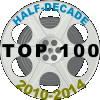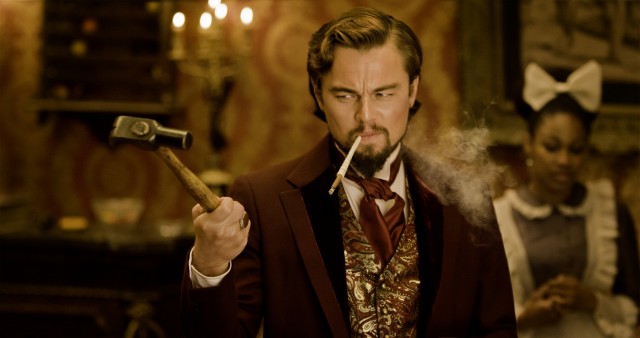Django Unchained Movie Review
 |
Django Unchained
Theatrical Release: December 25, 2012 / Running Time: 165 Minutes / Rating: R Writer/Director: Quentin Tarantino Cast: Jamie Foxx (Django Freeman), Christoph Waltz (Dr. King Schultz), Leonardo DiCaprio (Calvin Candie), Kerry Washington (Broomhilda), Samuel L. Jackson (Stephen), Walton Goggins (Billy Crash), Dennis Christopher (Leonide Moguy), James Remar (Butch Pooch, Ace Speck), David Steen (Mr. Stonesipher), Dana Gourrier (Cora), Nichole Galicia (Sheba), Laura Cayouette (Lara Lee Candie-Fitzwilly), Ato Essandoh (D'Artagnan), Sammi Rotibi (Rodney), Clay Donahue Fontenot (), Escalante Lundy (Big Fred), Miriam F. Glover (Betina), Don Johnson (Big Daddy), James Russo (Dicky Speck), Tom Wopat (U.S. Marshall Gill Tatum), Don Stroud (Sheriff Bill Sharp), Russ Tamblyn (Son of a Gunfighter), Amber Tamblyn (Daughter of a Son of a Gunfighter), Bruce Dern (Old Man Carrucan), M.C. Gainey (Big John Brittle), Cooper Huckabee (Lil Raj Brittle), Doc Duhame (Ellis Brittle), Jonah Hill (Bag Head #2), Lee Horsley (Sheriff Gus), Zoe Bell (Tracker), Michael Bowen (Tracker), Robert Carradine (Tracker), Jake Garber (Tracker), Ted Neeley (Tracker), James Parks (Tracker), Tom Savini (Tracker), Michael Parks (LeQuint Dickey Mining Co. Employee), John Jarratt (LeQuint Dickey Mining Co. Employee), Quentin Tarantino (LeQuint Dickey Mining Co. Employee) |
 | Django Unchained ranks 47th in our list of the Top 100 Movies of the Half-Decade (2010-2014). |
Buy Django Unchained from Amazon.com: Blu-ray + DVD + Digital Copy • DVD • Instant Video
Since rising to importance with 1994's Pulp Fiction, Quentin Tarantino has spent his career paying homage to the genres he enjoys: Jackie Brown to blaxpoitation, Kill Bill to samurai movies, Death Proof to grindhouse cinema. His previous film, 2009's Inglourious Basterds, did more than just win the approval of his passionate fan base. It won widespread raves and became the writer/director's first real Oscar contender since Pulp Fiction. Django pays tribute to spaghetti westerns, a genre that Tarantino has already celebrated musically. Further proving that his Oscar-winning antagony in Inglourious was not a fluke, Christoph Waltz again earns our full attention, this time as Dr. King Schultz, a traveling dentist from Germany who makes his living as a generally law-abiding bounty hunter.
The film opens two years before the American Civil War, with Schultz looking for and finding the recently resold slave Django (Jamie Foxx). Playing out with the sharp, deliberate dialogue and unflinching violence we expect from Tarantino, Schultz's purchase of Django is the start of both a friendship and a business partnership. Django quickly develops into a sharpshooter and he and Schultz spend the winter collecting large rewards on outlaws wanted dead or alive (they always opt for "dead"). These portions of the film are as much buddy comedy as anything else, but buddy comedy fitted with cinematic splendor and dramatic weight.
Inspired by Django's story, Schultz vows to help him track down his wife Broomhilda (Kerry Washington), who has been sold to Candyland, one of Mississippi's biggest plantations. Schultz and Django plan an elaborate ruse by which to acquire Broomhilda legally and without suspicion. To flamboyant owner Calvin Candie (Leonardo DiCaprio), they pose as cultured businessmen looking to get into the world of Mandingo fights, a brutal activity that pits slave versus slave in to-the-death, anything-goes, hand-to-hand wood floor combat.
Django is arresting cinema for most of its nearly three-hour runtime, Tarantino having impressive command of everything technical to complement his confident use of writing and actors. If only the director could have ended the film twenty minutes earlier than he does. If so, Django would have been a genuine masterpiece and a potential Oscar frontrunner. Instead, the director plays to the expectations he has built for himself, closing with perhaps the bloodiest finale ever committed to film.
Seemingly determined to make the climax of Scarface (1983) look tame, the unabashedly over-the-top violence splatters walls with blood, piles up casualties, and chips away at our heroes' effortlessly established likability and moral code. Obviously, many viewers will take delight in these gruesome moments. It's possible to liken them to comparable carnage from Inglourious Basterds. But though executed with the sense of humor shared by the rest of the film, they do not wield depth beneath the surface. The bloodbath may well be Tarantino's way of exorcising the demons in one of the uglier chapters of American history. In doing so, he trivializes the plight of slavery and undermines the stellar work he has done in the over two hours before.
That work is excellent enough to be able to overlook that unfortunate, unsatisfying ending and still declare Django one of the year's best films. But it makes Tarantino fall short of his potential and reinforces the ceiling that stands above his legacy. Tarantino's use of Blazing Saddles-type comedy is easy to appreciate and historically loaded language easy to tolerate. His stunt casting remains an appealing and integral part of his process (this one includes Don Johnson as plantation owner Big Daddy to Jonah Hill as a KKK member in a broadly comedic and comedically long sequence to Samuel L. Jackson uncovering some range as an Uncle Tom-type servant). His decision to have unrestrained violence achieve his film's resolution is much less endearing, the sign of a lazy filmmaker determined to meet expectations and content to value the base desires of his core fan base over the interests of sound storytelling and the tastes of the general moviegoing public. One imagines a Tarantino film about slave traders and bounty hunters not culminating in copious bloodshed would provoke some outrage. But it would have made Django a great film, instead of merely a very good one.
Buy Django Unchained from Amazon.com: Blu-ray Combo / DVD / Instant Video
|
Related Reviews:
DVDizzy.com | DVD and Blu-ray Reviews | New and Upcoming DVD & Blu-ray Schedule | Upcoming Cover Art | Search This Site
DVDizzy.com Top Stories:
Written and Directed by Quentin Tarantino: Jackie Brown • Four Rooms
Christoph Waltz: The Green Hornet | Jamie Foxx: Horrible Bosses • The Soloist • Dreamgirls • Due Date • Rio
Leonardo DiCaprio: Catch Me If You Can • J. Edgar • Titanic • Revolutionary Road • Body of Lies
2012 Dramas: Life of Pi • Beasts of the Southern Wild • Lawless • The Dark Knight Rises • The Hobbit: An Unexpected Journey
Text copyright 2012 DVDizzy.com. Images copyright 2012 The Weinstein Company. Unauthorized reproduction prohibited.



